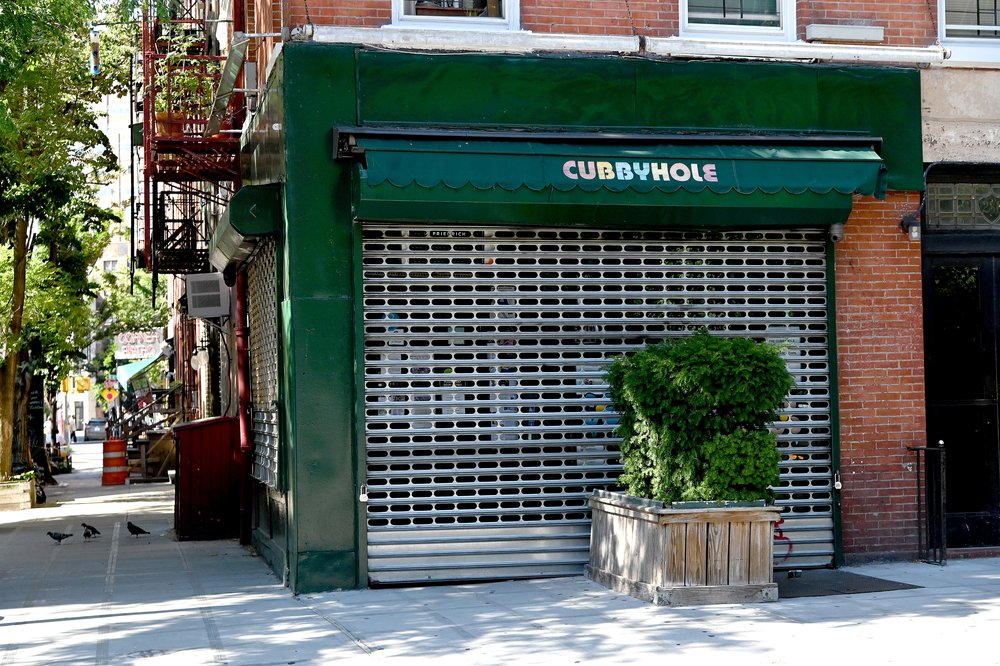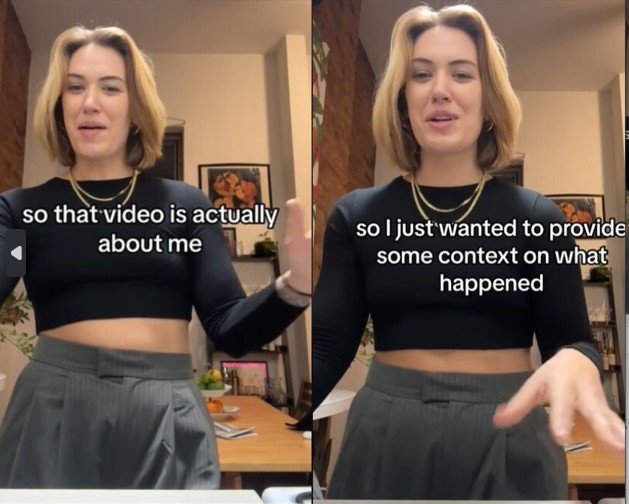Incident at NYC lesbian bar Cubbyhole sparks debate about who belongs there
Feb. 7, 2024, 4:23 p.m.
A real-life incident revived an online debate about who belongs in queer spaces.

Who belongs in a lesbian bar?
A minor altercation at a longtime West Village bar has revived this question online and prompted debate about queer spaces and whom they “belong” to. Like many viral conversations, this one started on TikTok.
In January, New York City-based influencer Lexi Stout posted a video about her night out at Cubbyhole, a lesbian bar on West 12th Street that has been a community staple for more than 30 years.
In the video, Stout says a lesbian friend invited her to Cubbyhole, and that she was having a blast during her first time at a lesbian bar.
But Stout said that after her straight male friend popped in to say hi, another woman approached him and asked, “‘What are you doing here?’”
In her video, Stout described feeling unwelcome and also taken aback as the bar was full of “flamboyantly gay men.” She did not respond to a request for comment for this article.
Near the end of her video, Stout asked the camera, “Are straight males not allowed to go to a lesbian bar?”
Two weeks, 7,000-plus comments, and 1.5 million views later, Katie Pypes, the woman who allegedly provoked the confrontation, decided to respond with a TikTok of her own.

In it, she recalled the event differently and noted that important context was missing.
Pypes said that on that particular day in January, she was enjoying a regular night at Cubbyhole, where she met her wife nearly a decade ago.
She said that as she made her way to the cramped, 824-square-foot establishment's restrooms, she found that Stout's straight male friend was blocking her path.
“I tapped him on the shoulder and said, ‘Hey excuse me, no one can get through,’” Pypes said in a phone interview on Tuesday. “He rolled his eyes at me and scoffed a bit, so I asked him, ‘What are you doing in this bar?’ It didn’t go well.”
Pypes said that after Stout’s friend group stepped in to clarify that the man was with them, he asked her, “If I wasn’t with her, would that be a problem?”
Pypes added that when she responded, “yes, absolutely,” the incident went the way of many a bar argument, with both parties trading barbs on the sidewalk.
“It’s not how I wanted to spend my night,” Pypes said.
Pypes said she is “not an internet person” and didn’t have a TikTok account until last week.
In fact, she only created her TikTok account to post her take on the incident.
After a friend showed her Stout’s video and noted that the story sounded like one Pypes had told, Pypes created an account and responded to Stout’s video. Her response now has 3.7 million views and nearly 10,000 comments.
Pypes said that while the experience at the bar was upsetting, it wasn’t the first one like it, and probably won’t be the last.
“Slowly, over time, as these incidents take place, it does erode the safe queer spaces,” Pypes said. “Queer women have responded saying, ‘Something similar happened to me and now I no longer engage in these spaces at all, because it was traumatizing for me.’”
Jack Jen Gieseking, a research fellow at Hampshire College who has published extensively on queer and trans spaces, said this is an old conversation in the queer community.
“Go back and scroll through the comments of any lesbian bar that’s ever existed that had an Instagram,” Gieseking said. “I would not be surprised if you didn’t see some sort of incident like this.”
Still, he said that the magnitude of the online reaction to the Cubbyhole incident was surprising.
“I follow all the lesbian bar Instagrams and all the TikToks, and the attention pales in comparison to this incident,” Gieseking said. “I think the reason is because this was about not letting in cis straight men, and they are very powerful.”
Gieseking said lesbian bars carry an expectation of not being sexualized, or having to relinquish space to cisgender men.
“Even the question, ‘Did you come with this person?’ means something – there’s a trust in community in this time where rights are under attack,” Gieseking said.
As the conversation spiraled out in the nature of viral TikTok debates, with person after person weighing in with their own take on the situation, the consensus seemed to coalesce on Pypes’ side, noting that the original video didn’t tell the whole story of why Pypes had questioned Stout’s straight male friend.
Bobbie Briceño, whose reaction to Stout’s TikTok garnered more than 200,000 views, likened being a guest in a queer space to being a plus-one at a wedding, and that guests should tread lightly.
She called the idea of explaining queer issues to Stout “hetsplaining.”
“[Stout] said ‘I’ve never felt like this before, I’ve never felt othered,’ so I tried to put it in a context she could understand,” Briceño said. “I think having someone come on and be so blatantly unaware and choosing not to listen is what really struck a chord with people.”
Pypes said she’d like Stout to understand “the immense amount of privilege she has, as a straight woman able to go on TikTok and ask that question, and not be able to understand how hard that experience was for me.”
“She probably assumed I was the bad guy,” Pypes said. “But I was really just a lesbian trying to pee in a lesbian bar.”
One of NYC's best-dressed parties happens once a month at the Brooklyn Museum An NYC matchmaking service that helps gay men find ‘The One’ — no pics allowed 23 fun and affordable things to do in NYC this winter 15 ideas to celebrate Lunar New Year in New York City